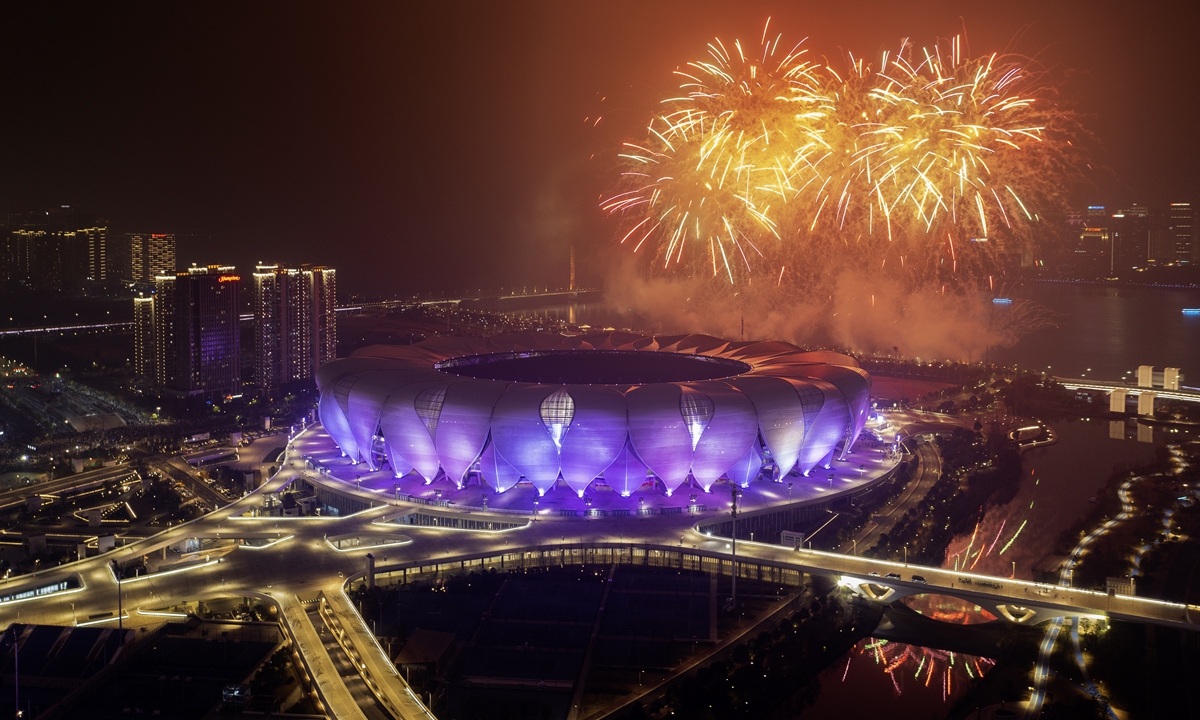ARTS / CULTURE & LEISURE
Hangzhou Asian Para Games take sports development for disabled to new heights

The Hangzhou Olympic Sports Center Stadium, the main venue for the Hangzhou Asian Games Photo: VCG
With widely used technological innovations such as a bionic arm and a robot guide dog, the Hangzhou Asian Para Games in East China’s Zhejiang Province have boosted accessibility and inclusiveness for people with disabilities, allowing them to take part in sports.
The authorities said at a press conference on Thursday in Hangzhou that the Asian Para Games offer a great opportunity to promote the development of new options for people with disabilities, safeguarding their equal rights and creating a better future for them.
Yong Zhijun, deputy secretary-general of the Chinese delegation of the Hangzhou Asian Para Games, told the Global Times that China has made remarkable achievements in the development of sports for the disabled and the Hangzhou Games inject fresh impetus.
“The legal and policy protection of sports for people with disabilities has been strengthened, and remarkable achievements have been made in rehabilitation, fitness and competitive sports for people with disabilities,” said Yong.
“First, what we have achieved is helpful to promote equality for disabled people in sharing sports; second, it is helpful to promote the popularization and development of sports projects for the disabled in China; third, it is helpful to show the achievements of disabled people's cause and the protection of human rights, and promote the harmony, stability and development of Asia. Last but not the least, we have created more valuable and sustainable resources for the benefit of the general public, including people with disabilities,” Yong noted.
Wang Kai, a Hangzhou citizen with disabilities, told the Global Times that the upgraded facilities around the city have made his life easier.
“When I went to watch the Games, the journey was barrier-free from getting off the bus to check in and arriving at the match viewing area. The volunteers also helped me a lot,” said Wang.
At the 2004 Athens Paralympic Games, the Chinese delegation won 63 golds, 46 silvers and 32 bronzes, topping the gold medal and overall medal table for the first time. In the subsequent Beijing, London, Rio and Tokyo Paralympic Games, the Chinese delegation continued their dominance of the medal table.
In 2002, China sent a four-member delegation to participate in the Winter Paralympic Games for the first time.
In the 2018 Pyeongchang Winter Paralympics, the wheelchair curling team won the first gold medal for the Chinese delegation at a Winter Paralympics. At the 2022 Beijing Winter Paralympic Games, the Chinese delegation ranked first in the gold medal list and overall medal list for the first time.
In September, a national law on building a barrier-free environment was enacted to promote the construction of accessible facilities and public services, to support people with disabilities in participating in public life.
Wang Hongwei, deputy director of the department of publicity and culture with the China Disabled Persons' Federation, told the Global Times that “by providing access to sports, we have safeguarded the rights of the disabled to participate equally in public life.”
Rehabilitation and mass fitness activities for disabled people at the grassroots level in urban and rural areas of China have seen rapid growth. According to the Xinhua News Agency, the participation rate of disabled people in community cultural and sports activities nationwide has continued to increase from 6.8 percent in 2015 to 23.9 percent in 2021.
Yang Yingying, president of Hangzhou Disabled Persons Federation, told the Global Times that three things need to be done to build on the legacies of the Hangzhou Games.
"The first is to further promote the construction of sports facilities for the disabled, the second is to actively hold sports events and activities for the disabled, and the third is to bolster the training of professionals to serve the disabled," said Yang.
"We have seen a stronger sense of integration. More people with disabilities are becoming participants, contributors and beneficiaries of the city's development," she said.
